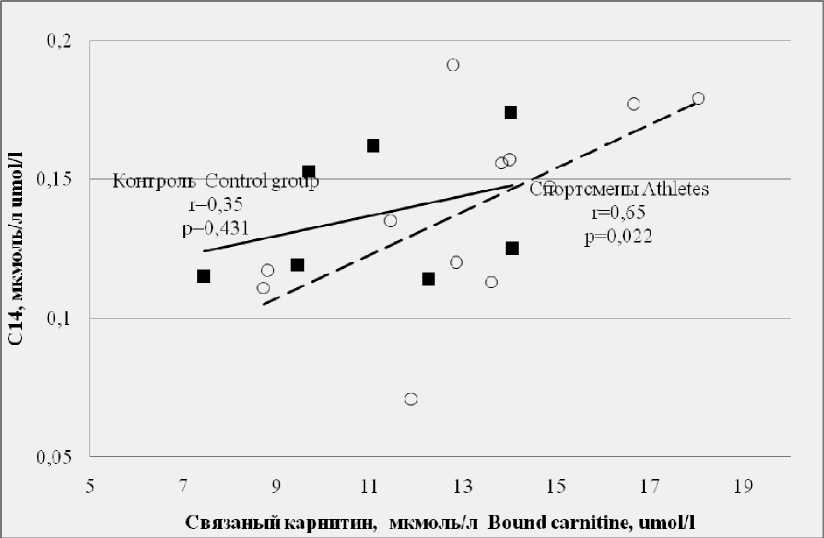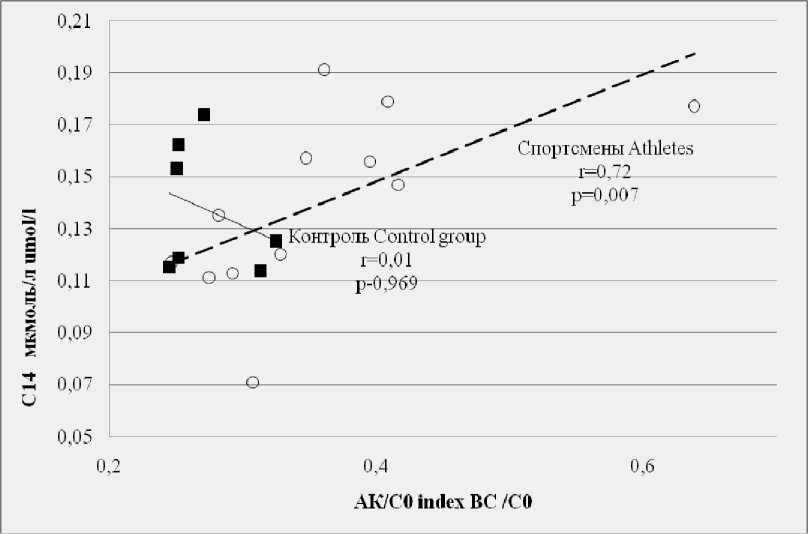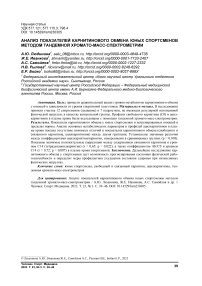Анализ показателей карнитинового обмена юных спортсменов методом тандемной хромато-масс-спектрометрии
Автор: Людинина А.Ю., Иванкова Ж.Е., Самойлов А.С., Рылова Н.В., Бойко Е.Р.
Журнал: Человек. Спорт. Медицина @hsm-susu
Рубрика: Физиология
Статья в выпуске: 3 т.23, 2023 года.
Бесплатный доступ
Цель: провести сравнительный анализ уровня метаболитов карнитинового обмена у юношей в зависимости от уровня спортивной подготовки. Материалы и методы. В исследовании приняли участие 12 спортсменов (плавание) и 7 подростков, не имеющих регулярной интенсивной физической нагрузки, в качестве контрольной группы. Профили свободного карнитина (C0) и ацилкарнитинов в плазме крови были исследованы с помощью тандемной хромато-масс-спектрометрии. Результаты. Показатели карнитинового обмена у юных спортсменов и нетренированных юношей в пределах нормы. Анализ основных метаболических параметров и профилей ацилкарнитинов в плазме крови показал отсутствие значимых отличий в показателях карнитинового обмена (свободного и связанного карнитина, ацилкарнитинов) между двумя группами. Установлены значимые различия между коэффициентами ацилкарнитин/карнитин, измеренными в сравниваемых группах (p = 0,018). Показаны значимые положительные корреляции между содержанием связанного карнитина и уровнем С14 (тетрадеканоилкарнитин) (r = 0,65; p = 0,022), а также коэффициентом АК/С0 и уровнем С14 (r = 0,72; p = 0,007) в плазме крови спортсменов. Заключение. Дальнейшее исследование карнитинового обмена у спортсменов даст возможность прогнозирования состояния физической работоспособности и определит меры профилактики ухудшения состояния здоровья при интенсивных физических нагрузках.
Юные спортсмены, свободный и связанный карнитин, ацилкарнитины, тандемная хромато-масс-спектрометрия
Короткий адрес: https://sciup.org/147241872
IDR: 147241872 | УДК: 577.121, | DOI: 10.14529/hsm230305
Текст научной статьи Анализ показателей карнитинового обмена юных спортсменов методом тандемной хромато-масс-спектрометрии
Введение. Метаболические факторы играют центральную роль в утомлении во время длительных упражнений на выносливость. Мышечный и печеночный гликоген является основным источником энергии в начале и на поздних этапах гонки на выносливость [14], поддерживая сократительные свойства мышц и замедляя развитие утомления [5, 14]. Улучшить энергетические резервы можно за счет использования большего количества жирных кислот и карнитиновых производных, а также экономии гликогена [14].
Концентрация в крови метаболитов карнитинового обмена митохондриального происхождения отражает транспорт жирных кислот [3, 4, 11, 16]. L-карнитин играет основную физиологическую роль в митохондриальном β-окисление, в обмене ацильных и ацетильных групп с КоА в митохондриях, и, таким образом, в изменении соотношения ацил-КоА/КоА, и, соответственно, соотношения ацилкарнитин/карнитин, в образовании кето-
новых тел, в окислении жирных кислот в пероксисомах [6, 10].
Доказано, что для оценки особенностей клеточной энергетики (в зависимости от пола и вида физической нагрузки) необходимо изучать состояние карнитинового обмена. Большинство работ по карнитиновому обмену в спорте посвящены изучению приема добавок, содержащих карнитин. Во многих исследованиях отмечается недостаточная эффективность перорального приема L-карнитина, которую связывают с его низкой биодоступностью и неспособностью увеличить запасы карнитина в мышцах [1, 2, 13]. Учитывая ограниченные исследования в области карнитинового обмена и практически полное отсутствие работ об уровне метаболитов карнитинового обмена в крови спортсменов, необходимы дальнейшие исследования для выяснения роли карнитина в повышении ФР. Кроме того, карнитин и ацилкарнитины могут быть биомаркерами митохондриального метаболизма и
Таблица 1
Table 1
Сравнительная морфофункциональная характеристика обследуемых (М ± SD) Morphofunctional characteristics of the subjects (М ± SD)
|
Группа Group |
Масса тела, кг Body mass, kg |
% жировой массы тела Fat mass, % |
Относительное МПК Relative MOC |
Абсолютное МПК Absolute MOC |
|
Спортсмены Athletes n = 12 |
67,9 ± 7,27 |
13,57 ± 3,7* |
60,44 ± 3,8 |
4,06 ± 0,4 |
|
Контроль Control group n = 7 |
69,43 ± 15,21 |
23,6 ± 6,38 |
39,95 ± 7,41 |
2,68 ± 0,21 |
|
Величина p P value |
0,799 |
0,001 |
0,001 |
0,001 |
Таблица 2
Table 2
Показатели карнитинового обмена спортсменов и юношей из контрольной группы (М ± SD) Carnitine metabolism in athletes and young males in the control group (М ± SD)
|
Группа Group |
Свободный карнитин, мкмоль/л Free carnitine (С0), umol/l |
Связанный карнитин, мкмоль/л Bound carnitine (BC), umol/l |
АК/С0 BC/С0 |
Ацетилкарнитин, мкмоль/л Acetylcarnitine, umol/l |
% ацетилкарнитина в свободном карнитине % acetylcarnitine in free carnitine, % |
|
Спортсмены Athletes n = 12 |
37,3 ± 5,5 |
13,1 ± 2,8 |
0,36 ± 0,10 |
6,9 ± 2,1 |
0,5 ± 0,10 |
|
Контроль Control group n = 7 |
40,6 ± 6,6 |
11,1 ± 2,5 |
0,27 ± 0,03 |
5,7 ± 1,5 |
0,5 ± 0,04 |
|
Величина p P value |
0,352 |
0,236 |
0,018 |
0,272 |
0,499 |
Таблица 3
Table 3
Профиль ацилкарнитинов в плазме крови спортсменов и юношей из контрольной группы (М ± SD) Blood plasma acylcarnitines in athletes and young males in the control group (М ± SD)

Рис. 1. Содержание С14 в зависимости от концентрации связанного карнитина в плазме крови юношей исследуемых групп
Fig. 1. C14 levels depending on the plasma concentration of bound carnitine in subjects
риальную биоэнергетику и активизируют белки, связанные с метаболизмом липидов, используя в основном пальмитоилкарнитин [17].
Ключевой адаптацией к аэробным нагрузкам является увеличение содержания митохондрий, что необходимо для удовлетворения
энергетических потребностей тренировки на выносливость [16]. Также известно, что аэробные нагрузки усиливают митохондриальную способность окислять жирные кислоты [12] и способствуют повышению запасов внутриклеточных триацилглицеринов [7].
|
Ацилкарнитины, мкмоль/л Acetylcarnitine, umol/l |
Спортсмены / Athletes n = 12 |
Контроль / Control group n = 7 |
Величина p P value |
|
С8 октаноилкарнитин octanoylcarnitine |
0,08 ± 0,12 |
0,05 ± 0,03 |
0,933 |
|
С10 деканоилкарнитин decanoylcarnitine |
0,05 ± 0,04 |
0,04 ± 0,03 |
0,899 |
|
С12 додеканоилкарнитин dodecanoylcarnitine |
0,15 ± 0,07 |
0,16 ± 0,08 |
0,375 |
|
С14 тетрадеканоилкарнитин tetradecanoylcarnitine |
0,14 ± 0,03 |
0,14 ± 0,02 |
0,866 |
|
С16 гексадеканоилкарнитин hexadecanoylcarnitine |
0,69 ± 0,29 |
0,75 ± 0,23 |
0,833 |
|
C18 стеароилкарнитин stearoylcarnitine |
0,38 ± 0,16 |
0,41 ± 0,09 |
0,582 |
|
C14:1 тетрадеценоилкарнитин tetradecenoylcarnitine |
0,25 ± 0,1 |
0,29 ± 0,09 |
0,352 |
|
C16:1 гексадеценоилкарнитин hexadecenoylcarnitine |
0,09 ± 0,03 |
0,09 ± 0,04 |
0,703 |
|
С18:1 олеилкарнитин oleylcarnitine |
0,68 ± 0,12 |
0,67 ± 0,15 |
0,933 |

Рис. 2. Содержание в плазме крови С14 в зависимости от коэффициента АК/С0 у юношей исследуемых групп
Fig. 2. C14 plasma levels depending on the BC/C0 ratio in subjects
Ограничения исследования связаны с возрастом обследуемых юношей и их уровнем тренированности. Бесспорно, увеличение объёма выборки участников исследования привело бы к более значимым статистическим данным. Будущие исследования должны быть направлены на увеличение объема выборки обследуемых лиц и повышение их спортивной квалификации.
Заключение. Таким образом, значимые положительные корреляции между содержанием связанного карнитина (r = 0,65; p = 0,022)
и коэффициентом АК/С0 (r = 0,72; p = 0,007) с уровнем С14 (тетрадеканоилкарнитин) в плазме крови спортсменов позволяют предположить вовлечение миристиновой кислоты (С14:0) в процесс энергообеспечения физической работоспособности юных пловцов.
Исследование показателей карнитинового обмена, а также зависимостей между содержанием карнитина и его ацильных производных даёт возможность оценить состояние физической работоспособности юных спортсменов и состояние клеточного энергообеспечения.
Список литературы Анализ показателей карнитинового обмена юных спортсменов методом тандемной хромато-масс-спектрометрии
- AbuMoh’d M.F., Obeidat G., Alsababha W. Effect of Oral Supplementation with L-Carnitine on Performance Time in a 5000 m Race and Responses of Free Fatty Acid and Carnitine Concentrations in Trained-Endurance Athletes. Montenegrin Journal of Sports Science and Medicine, 2021, vol. 10, iss. 2, pp. 5–11. DOI: 10.26773/mjssm.210901
- Barnett C., Costill D.L., Vukovich M.D. et al. Effect of L-Carnitine Supplementation on Muscle and Blood Carnitine Content and Lactate Accumulation During High-Intensity Sprint Cycling. International Journal of Sport Nutrition, 1994, vol. 4, iss. 3, pp. 280–288. DOI: 10.1123/ijsn.4.3.280
- Bene J., Hadzsiev K., Melegh B. Role of Carnitine and its Derivatives in the Development and Management of Type 2 Diabetes. Nutrition and Diabetes, 2018, vol. 8, p. 8. DOI: 10.1038/s41387-018-0017-1
- El-Gharbawy A., Vockley J. Inborn Errors of Metabolism with Myopathy: Defects of Fatty Acid Oxidation and the Carnitine Shuttle System. Pediatric Clinics of North America, 2018, vol. 65, pp. 317–335. DOI: 10.1016/j.pcl.2017.11.006
- Gandevia S.C. Spinal and Supraspinal Factors in Human Muscle Fatigue. Physiological Reviews, 2001, vol. 8, iss. 4, pp. 1725–1789. DOI: 10.1152/physrev.2001.81.4.1725
- Hoppel Ch. The Role of Carnitine in Normal and Altered Fatty Acid Metabolism. American Journal of Kidney Diseases: the Official Journal of the National Kidney Foundation, 2003, vol. 41, pp. 4–12. DOI: 10.1016/s0272-6386(03)00112-4
- Horowitz J.F., Klein S. Lipid Metabolism During Endurance Exercise. The American Journal of Clinical Nutrition, 2000, vol. 72, suppl. 2, pp. 558–563. DOI: 10.1093/ajcn/72.2.558S
- Irrcher I., Adhihetty P.J., Joseph A.M. et al. Regulation of Mitochondrial Biogenesis in Muscle by Endurance Exercise. Sports Medicine, 2003, vol. 33, iss. 11, pp. 783–793. DOI: 10.2165/00007256-200333110-00001
- Lennon D.L.F., Shrago E.R., Madden M. et al. Dietary Carnitine Intake Related to Skeletal Muscle and Plasma Carnitine Concentrations in Adult Men and Women. Food Chemistry, 1984, vol. 86, pp. 137–142. DOI: 10.1093/ajcn/43.2.234
- Löster H., Miehe K., Punzel M. et al. Prolonged Oral L-carnitine Substitution Increases Bicycle Ergometer Performance in Patients with Severe, Ischemically Induced Cardiac Insufficiency. Cardiovascular Drugs and Therapy, 1999, vol. 13, pp. 537–546. DOI: 10.1023/A:1007883822625
- McCann M.R., De la Rosa M.V.G., Rosania G.R., Stringer K.A. L-Carnitine and Acylcarnitines: Mitochondrial Biomarkers for Precision Medicine. Metabolites, 2021, vol. 11, iss. 1, p. 51. DOI: 10.3390/metabo11010051
- Melanson E.L., MacLean P.S., Hill J.O. Exercise Improves Fat Metabolism in Muscle but Does not Increase 24-h Fat Oxidation. Exercise and Sport Sciences Reviews, 2009, vol. 37, iss. 2, pp. 93–101. DOI: 10.1097/JES.0b013e31819c2f0b
- Novakova K., Kummer O., Bouitbir J. et al. Effect of L-Carnitine Supplementation on the Body Carnitine Pool, Skeletal Muscle Energy Metabolism and Physical Performance in Male Vegetarians. European Journal of Nutrition, 2016, vol. 55, iss. 1, pp. 207–217. DOI: 10.1007/s00394-015-0838-9
- Petersen K., Hansen C.B., Aagaard P., Madsen K. Muscle Mechanical Characteristics in Fatigue and Recovery from a Marathon Race in Highly Trained Runners. European Journal of Applied Physiology, 2007, vol. 101, pp. 385–396. DOI: 10.1007/s00421-007-0504-x
- Rebouche C.J. Carnitine Function and Requirements During the Life Cycle. FASEB, 1992, vol. 6, pp. 3379–3386.
- Reuter S.E., Evans A.M. Carnitine and Acylcarnitines: Pharmacokinetic, Pharmacological and Clinical Aspects. Clinical Pharmacokinetics, 2012, vol. 51, pp. 553–572. DOI: 10.1007/BF03261931
- Warren J.L., Hunter G.R., Gower B.A. et al. Exercise Effects on Mitochondrial Function and Lipid Metabolism during Energy Balance. Medicine and Science in Sports and Exercise, 2020, vol. 52, iss. 4, pp. 827–834. DOI: 10.1249/MSS.0000000000002190


